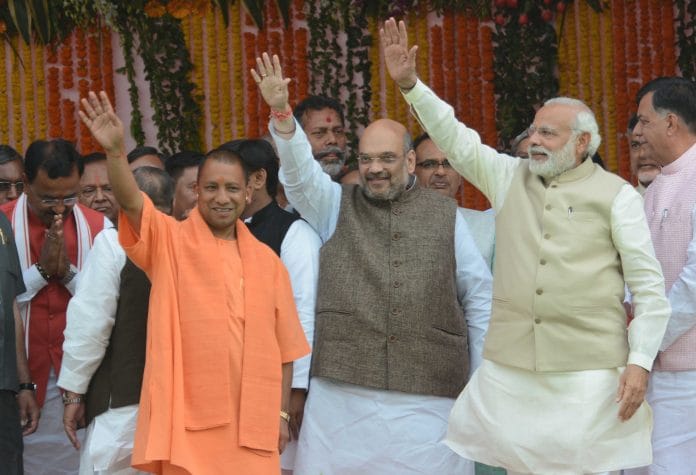The SP-BSP alliance makes sure that 2019 will be a rare occasion in recent memory: A bipolar contest in Uttar Pradesh.
The alliance between the Samajwadi Party and the Bahujan Samaj Party in Uttar Pradesh is the single greatest threat to Prime Minister Narendra Modi’s re-election prospects in 2019. It is obvious that the BJP will do something to reduce the damage it could cause. What could it be?
1. Divide the state: The BJP could pass a resolution in the Uttar Pradesh state assembly, asking the Centre to divide the state, carving out Purvanchal (eastern UP) and Bundelkhand as separate states.
The BJP is historically opposed to creating a new state out of western UP, since the concentration of Muslims in that region doesn’t bode well for the BJP’s electoral prospects. This is why it could retain western UP and Awadh together as Uttar Pradesh, but create two new states out of the eastern flanks.
The actual division could take years, but the announcement of division could be made now. This might help the BJP convince voters across the state, from Saharanpur to Sonbhadra, from Agra to Kushinagar, that making smaller states out of UP will improve administration and finally bring them achhe din.
2. Consolidate core voters: The alliance makes sure that 2019 will be a rare occasion in recent memory: A bipolar contest in Uttar Pradesh. Even the Jat-dominated Rashtriya Lok Dal and the Congress, along with myriad small parties, could join hands with the SP-BSP alliance.
The BJP cannot afford to lose any of its core voters in Uttar Pradesh. It will have to work hard to make sure that the perception of ‘Thakurwaad’ or Thakur-domination under the regime of a Thakur chief minister does not alienate Brahmins. The Modi government can no longer take Baniyas for granted, with its drives against black money and tax evasion. The party’s recent acquisition of Naresh Agarwal should thus be seen not being about just one more vote in a Rajya Sabha election, but also as a signal to Baniya votes. Making upper caste voters turn out to vote is always a tough task.
3. Lord Ram: Regardless of what the Supreme Court decides on the land ownership issue in Ayodhya, chief minister Yogi Adityanath has already decided he wants to create a new township called ‘New Ayodhya’ spread over 500 acres. This comes after his announcement of a 100 metre tall statue of Lord Ram on the banks of the Sarayu river, costing Rs 330 crore.
Regardless of what the Supreme Court says on the Ram Mandir, as long as it gives some judgment before 2019, it will help the BJP. If the judgment is against the building of a new Ram Mandir on the Babri Masjid site, it will create opportunities for Hindutva victimhood to be exploited for votes. If the judgment helps build a temple, it will be a moment of Hindutva vindication. Either way, it will help consolidate votes in the name of Hindutva, especially crucial for keeping upper caste and non-Yadav OBC votes intact. Such voters may be upset with the BJP for other reasons (caste representation, jobs, farm issues), but the party could retain them with the help of Lord Ram.
4. Sub-quotas: CM Adityanath has already revealed his intention of bringing in sub-quotas for both OBCs and the Scheduled Castes. The central government has also been hinting at sub-dividing the central OBC list. These moves will help improve the chances of non-Yadav OBCs over Yadavs to earn an OBC reserved seat. This will make sure that the SP and the BSP continue to be unattractive for non-Yadav OBC voters.
Similarly, copying Nitish Kumar’s Mahadalit formula, the BJP could institutionalise the divide between Jatavs and other Dalit communities in Uttar Pradesh. By especially targeting the main non-Jatav vote, that of Pasis, the BJP could bring down the SP-BSP alliance’s vote shares, especially in central Uttar Pradesh.
These two moves could restrict the SP and BSP’s combined vote share to largely that of the Yadavs, Muslims and Jatavs. This would come to around 40 per cent of the electorate, still leaving the BJP with the edge of 60 per cent of the votes to work with.







# 5. Yogiji could make a name for himself as an able administrator, someone who will make a tangible improvement to the living standards of 200 million Indians.